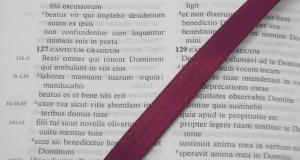In this post, we continue our look at surprising, sometimes humorous fun details to be found in the Latin Bible (see http://www.patheos.com/blogs/tomhobson/2017/08/fun-latin-bible/ for last time).

The Latin also adds punch to the evils spoken of in Job 31:11 (lusting for a virgin, or for someone’s wife) and Leviticus 20:13 (same-sex intercourse) as being not just malum (bad), but nefas (a notorious evil), the same word used by the people when Saul decreed that Jonathan should die (hoc nefas est! – 1 Samuel 14:45). And the evil demanded by the men of Gibeah is called scelus hoc contra naturam (Judges 19:24 – the words “contrary to nature” are added by Jerome to the text).
The heretic Marcion’s famous refrain of denial, Absit! (“Far be it!”, as quoted many times by Tertullian) is used 32x in the Latin Bible. Abraham says to God in Genesis 18:25, Absit a tē (“Far be it from thee”) to slay the righteous with the wicked! The people say to Joshua in Joshua 24:16, Absit a nobīs (“Far be it from us”) to forsake the Lord. And Absit! becomes the standard way to translate Paul’s famous line, Mē genoito! (“May it never be!”)
Sometimes, the Latin goes beyond the meaning of the original; while Jacob complains in Genesis 31:42 that Laban almost sent him away “empty” (rēqam), the Latin has him say nudum (“naked”!). In Esther 5:14, 8:7 and 9:25, a 75-foot gallows is called a crux (cross). Sometimes, there is even confusion: in Judges 15:19, where the Hebrew says that God opened the maktesh (ground-down or “hollow [place]”) at Lehi, and water came forth, the Latin says that God opened the molar tooth (another meaning of maktesh) in the jawbone (the meaning of the place-name Lehi) of the donkey (not in the text at all in this verse!), and water came forth (!). In 1 Samuel 15:4, where Saul numbers his troops “in Telaim,” the Latin reads quasi agnōs, “as if they were lambs.”
But sometimes the Latin is more literal than our Bibles. While the Hebrew of Judges 3:24 says that Eglon must be “covering his feet,” the Latin says purgat alvum (“he is emptying his bowel” – similarly, 1 Samuel 24:4). When the men of Gibeah demand that the Levite be brought out to them “so that we may know him” (Judges 19:22), the Greek says literally “know him,” but the Latin reads “so that we may abuse (abutamur) him.” In Genesis 43:34, while our Bibles says that Joseph’s brothers “were merry” with him, both the Latin, the Greek, and the Hebrew say that they “got drunk” with him (Hebrew wayyishkeru, Greek emethysthēsan, Latin inebriatī sunt). Which is one example of why we must not take a “monkey-see, monkey-do” approach to the behavior of Biblical characters, but must rely on clear ethical teaching passages such as Ephesians 5:18 in a case like this.
The Latin Bible is a wonderful supplement to textbooks such as Wheelock for those who are first learning Latin. There are copious examples of future active and passive participles, all four subjunctives, and both positive and negative question markers. Sarah asks in Genesis 18:13, Num vere paritura sum, anus? (“Am I, an old lady, really about to give birth?”) Num, a word used 54 times in the Vulgate, signals that she expects a “No” answer. Cain clearly implies a “No” answer when he asks in Genesis 4:9, Num custos fratris mei sum? The Latin Bible also regularly uses forms that Wheelock told us were rare, such as īvit for “he has gone” (20 times), the plural of inquit (inquiunt, “they said,” used seven times), and estō for “let it be” (82 times in the singular, 60 times in the plural estōte).
We are so thankful that somebody translated God’s word into the language of the Roman Empire, a resource destined to have a huge impact on the world for centuries. For Protestants like myself, the Vulgate carries no authority in itself as a version compared to others. Like the King James Version, it is merely a fascinating witness at one point in time to the text of God’s word that it translates, and it gives us clues to how that text was understood and was communicated to the vulgus (common people) who were that version’s intended audience.












